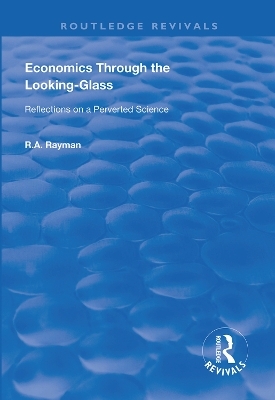
Economics Through the Looking-Glass
Routledge (Verlag)
978-0-367-00087-5 (ISBN)
Published in 1998. In spite of spectacular improvements in market flexibility, the characteristics of the past twenty years are slow growth and high unemployment. Economics Through the Looking-Glass exposes the theoretical fallacy at the heart of the New Economic Orthodoxy. The fallacy lies in treating the economy as a "single-gear" machine guaranteed to operate at its full employment potential as long as it benefits from the lubricant of perfectly flexible markets (in a Walrasian Utopia of continuous market-clearing equilibrium). Unemployment is thereby reduced to a structural problem of market imperfection. As a cure for unemployment, market flexibility is presumed to be adequate; as a cure for inflation, monetary restriction is presumed to be safe. The flaw in Orthodox logic is exposed by a demonstration that a monetary economy operates as a 'multi-gear' machine. Unless it is in 'top-gear', market flexibility (even of Utopian perfection) is not sufficient for full employment. 'Single-gear' Economic Orthodoxy is shown to have developed, not as a science, but as a religion beginning with Adam Smith's revelation of the Law of Competition. A Looking-Glass journey backwards in time from Adam Smith uncovers his suppression of the Law of Circulation and exposes the dangerous delusion of Orthodox economic policy. As a weapon against unemployment, market flexibility is inadequate; as a weapon against inflation, monetary restriction is unsafe. The 'multi-gear' alternative heralds the final stage of economic liberalisation: deregulation of the market for money. The rescue of interest rates from political or central bank interference and the control of inflation by a mechanism triggered by market forces would put an end to the Orthodox policy of maintaining unemployment above its natural market rate by misguided monetary intervention.
R.A. Rayman
Part 1: The Dismal Science 1. The End of Economic Civilization as We Know It 2. The Breakdown of Law and Order 3. It Came from Outer Space 4. The Dismal Science Part 2: Religion and the Rise of Monetarism 5. The Revelation 6. The Classical Doctrine 7. The Immaculate Conception 8. The Golden Age of Classical Orthodoxy 9. The Keynesian Reformation 10. The Neo-Classical Counter-Reformation 11. Monetarism in Excelsis 12. The New Orthodoxy 13. The Single-Gear Economy 14. Reality and the Fall of Monetarism Part 3: A Young Person's Guide to Economic Theory 15. Tweedledum and Tweedledee 16. The Invisible Hand 17. Money Makes the World go Round 18. Saving: The Noblest Virtue 19. Saving: The Deadliest Sin 20. Money is the Root of All Evil 21. The Multi-Gear Economy Part 4: What’s Wrong with Economic Theory 22. What’s Wrong with Classical Economics? 23. What’s Wrong with Keynes’s General Theory? 24. What’s Wrong with Monetarism? 25. What's Wrong with the New Orthodoxy? Part 5: Economics Through The Looking Glass 26. What's Wrong with Religion? 27. The New Inquisition 28. The Revolution that Never Was 29. The Immaculate Misconception 30. The Myth of Say's Law 31. The Revelation that Never Was 32. The Lost Commandment: The Law of Circulation Part 6: Back to the Future 33. David Hume (1711-1776) 34. Anne Robert Jacques Turgot (1727-1781) 35. Francois Quesnat (1694-1774) 36. Richard Cantillon (1680?-1734) 37. Bernard Mandeville (1670-1733) 38. John Law (1671-1729) 39. John Locke (1632-1704) 40. Sir William Petty (1623-1687) 41. The Merchantilists.
| Erscheinungsdatum | 04.06.2019 |
|---|---|
| Reihe/Serie | Routledge Revivals |
| Verlagsort | London |
| Sprache | englisch |
| Maße | 146 x 215 mm |
| Gewicht | 453 g |
| Themenwelt | Wirtschaft ► Allgemeines / Lexika |
| Wirtschaft ► Volkswirtschaftslehre | |
| ISBN-10 | 0-367-00087-3 / 0367000873 |
| ISBN-13 | 978-0-367-00087-5 / 9780367000875 |
| Zustand | Neuware |
| Informationen gemäß Produktsicherheitsverordnung (GPSR) | |
| Haben Sie eine Frage zum Produkt? |
aus dem Bereich


